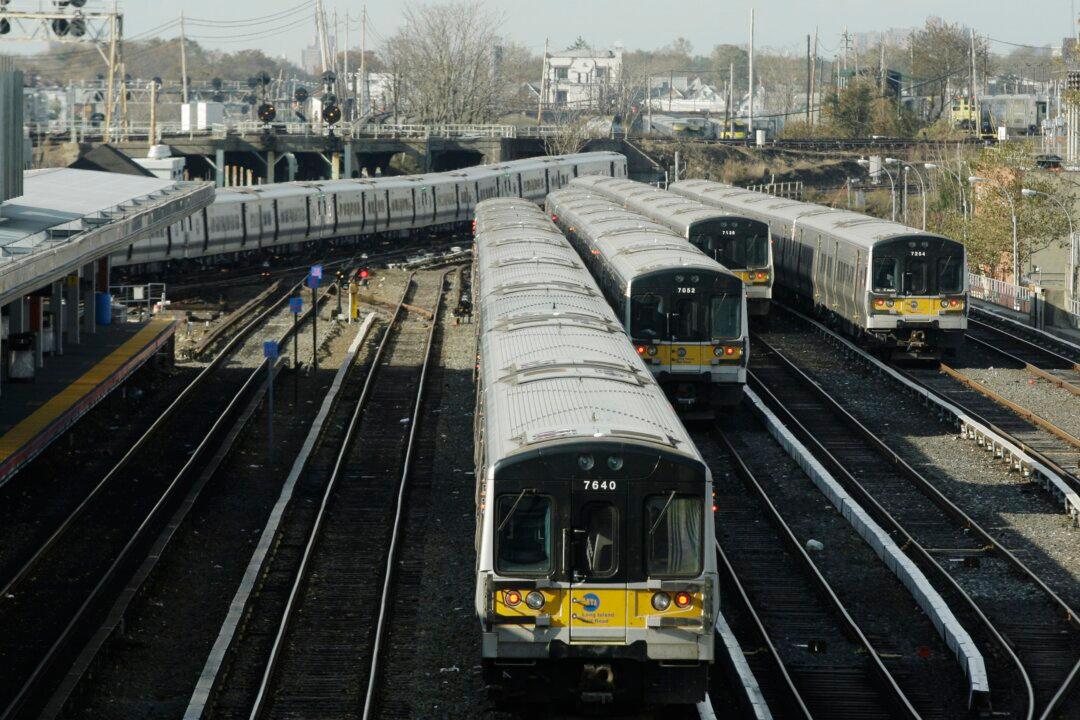NEW YORK—The unions representing the nation’s largest commuter railroad said that contract talks with the Metropolitan Transportation Authority have collapsed, making a strike this weekend much more likely.
Anthony Simon, the workers’ chief negotiator, said Monday afternoon that the eight Long Island Rail Road (LIRR) unions are now proceeding with strike plans.
The unions representing 5,400 workers have said they intend to strike unless an agreement is reached by July 20.
MTA Chairman Thomas Prendergast confirmed that talks broke down at a press conference on Monday afternoon. “Early on in that discussion it was apparent that there was a gap,” Prendergast said of the talks, adding that later on “it became apparent in that discussion that it was truly a gulf.”
Prendergast said that LIRR workers are the highest paid railroad workers in the nation and that the raises MTA offered would make them the highest paid of any rail workers in the region.
A strike would affect 300,000 daily riders, most of whom travel in and out of New York City from Long Island. About one in five LIRR commuters reside in Brooklyn or Queens.
The MTA released contingency plans last week in case of a strike, which include buses from Long Island to subway stations in Queens. But the authority said that nothing could replicate the LIRR, and advised commuters to stay at home or take vacation days.
Dispute History
Workers on LIRR have gone without a contract since 2010.
The unions’ final offer to MTA was identical to the recommendations of the two emergency boards appointed by President Barack Obama to investigate the dispute.
LIRR declined to follow the recommendations from both emergency boards. The second board issued its recommendations on May 20, giving the parties 60 days to resolve the dispute. That report allowed the unions to strike if no agreement was reached by July 20.
The final offer from the unions and the emergency boards included 17 percent pay raises over six years starting in 2010. It had no changes to pensions and work rules. It did include health care insurance contributions from workers averaging to $152 per month by 2015. The union members did not previously pay for health insurance.
The MTA’s final offer prior to May 20 required higher contributions for health benefits and multiple changes to pension benefits, all of which disadvantaged employees. After several counteroffers, Prendergast matched the unions demand for a 17 percent wage increase. But he said Monday that the unions’ proposal did not generate the savings MTA needed and could eventually put pressure on the authority to raise fares.
Mayor Still Planning on Vacation
The breakdown in negotiations comes days after Mayor Bill de Blasio announced his 10-day vacation in Italy. At an unrelated press conference on Monday, de Blasio said that he still plans to travel. The mayor’s spokesman has said that de Blasio would cut his vacation short in case of a major emergency.
De Blasio said that there are less people in town in July and that technology will allow many to work from home. Meanwhile, he said the city is preparing with additional buses and ferries.
“At this moment, from what I know from my conversation with Governor Cuomo on Friday, there’s still a very serious hope that we can resolve this,” de Blasio said before he was informed that talks have broken down.
Governor Won’t Act
Cuomo has not stepped in to attempt to resolve the dispute, deferring instead to Congress to resolve the dispute.
“This is federal law, and if the union goes on strike, it goes to the Congress, and the Congress basically resolves the strike,” Cuomo said at an unrelated press conference earlier this month. “They can dictate what the settlement is. It’s unique in that way in New York, unless we hear differently from the Congress.”
Meanwhile, Predergast met with several members of the New York House delegation in Washington, D.C. on July 9. “No one should bet on Congress stepping into this,” Rep. Peter King told The Associated Press after the meeting.
King and several other House members in New York’s delegation said they agreed that a solution to the labor issues should be resolved at the bargaining table.
The Associated Press contributed to this report.





